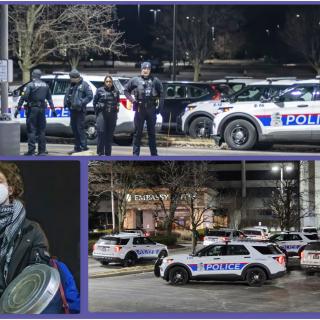Advertisement
Systemic racism. According to some sources it’s a form of racism that is embedded as a normal practice within society or an organization. Recently, Merriam-Webster has decided to change their definition of racism to reflect systemic oppression and examples of such actions. I don’t have to read someone else’s definition of systemic racism. In fact, no minority person, who is aware of what it entails, needs to read it. We live, hear about it and see it, almost daily.
It happens everywhere, even in the grocery line. I was fourth in the line at Save-a-Lot in Northern Lights on Cleveland Ave, which is in a minority area. The line had stopped moving and I heard the security guard, white, say “Where’s your receipt for that?” in an aggressive manner to a clean cut, nicely dressed middle aged Black man. The man was speaking in low voice tone and I didn’t hear his response. The guard said, “How do I know you brought that across the street?”
At this point, it was clear that the guard was not going to treat this man with respect and ask him to step aside with him so he could speak with him in private. Instead his plan was to humiliate the Black man, with an audience, and keep the six Black customers waiting in line while he did it. I asked him to treat the man with respect, and to not hold up the line. He ignored me at first until I repeated it again, in a firmer manner and complied, taking the man’s cart saying, “I’m going to check my camera. You wait!” The man looked confused and nervous.
I took my bags to the car and waited. After fifteen minutes I went back in and asked the man if he was alright and had the guard spoke with him again. He said, ‘No, he took my cart and went in his office. I didn’t steal anything.” I asked if I could speak on his behalf and when given permission I asked the guard to come out of the office and let him know if he could leave as there was no signs on the door asking people to leave their bags at the front desk upon entering (as you see often in Black neighborhood stores) and that he had had enough time to view his tape to see if he had stolen something. The guard got angry with me and wanted to know “Why are you so upset when he’s not, he OK with this?” My reply “Because he knows if he gets upset that you will call the police and accuse him of stealing and being disruptive and he might get shot and killed!” He went back in his office, came out in five minutes, and with no apology, gave the man the cart back and said, “Next time you come in here leave your bag at the front office.”
The man didn’t want me to use his name, but he did give me a statement. He said “I just feel like it’s rough out here for a Black man, I can understand what the man said, he didn’t know if I came in with it or not, so, I can understand that, but the way he did it, and approached me was kind of wrong. I mean he could have approached me in a better manner.” He also admitted that he didn’t say anything to defend himself because he didn’t want “any trouble” and that he appreciated me saying something to help him. This man lives in the neighborhood. He shops at this Save-a-Lot weekly and catches the bus. The Black man that stood behind me in the line when the incident began said “He (guard) always treats us like that, we complain about him all the time and they don’t do anything about him.” He too lives in the neighborhood and must shop there and be subjected to, yes, my readers, systemic racism from a person of society who works in an organization.
So, we people of color don’t need an updated definition of what systemic racism is or isn’t because we are victims of it. However, if updating the dictionaries will help change the minds of others, especially those who inflict it, say it doesn’t exist, chose to ignore it, and don’t want to change it, then by all means, update it. But we would rather see changes in society and organizations that dispel and remove systemic racism from their everyday lives. We don’t want to just save a lot; we want to be treated with respect and dignity too.



